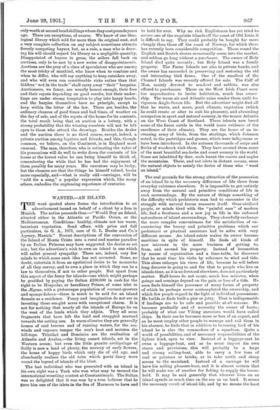WANTED,—AN ISLAND.
THE want quoted above forms the introduction to an advertisement issued on behalf of a client by a firm in Munich. The notice proceeds thus;—" Would Buy an Island, situated either in the Atlantic or Pacific Ocean, or the Mediterranean. Conditions; healthy, climate not too warm, luxuriant vegetation. Send offers, with price and full particulars, to G. A., 1871, care of G. L. Danbe and Co.'s Agency, Munich." Recent descriptions of the conversion of the Island of Monte Cristo into a rural and marine paradise by an Italian Princess may have suggested the desire so set out; but the advertiser's wish to own an island is one which will enlist general sympathy. There are, indeed, very few minds to which some such idea has not occurred. Some, no doubt, entertain it from an egotistical desire to be monarchs of all they survey, and to own a place in which they can be a law to themselves, if not to other people. But apart from this aspect of the fancy for islands—one which might perhaps be gratified by paying the Sultan £200,000 in cash for the right to be Hospodar, or hereditary Prince, of some islet in the lEgean, with a picturesque population of currant-growers and sponge-fishers—there is much to be said for an island domain as a residence. Fancy and imagination do not err in investing these sea-girt acres with exceptional charm. It is not for nothing that nearly all the islands of Europe lie on the west of the lands which they adjoin. They all seem fragments that have left the land and straggled seaward towards the setting sun. In warm climates they are generally homes of cool breezes and of running waters, for the sea- winds and vapours temper the sun's heat and moisten the hill-tops. Trinidad and Dominica are the realisation of Atlantis and Avalon,—the living sunset islands, set in the Western ocean; but even the little granite archipelago of Scilly is now a land of plenty, the nursery of early flowers, the home of happy birds which only die of old age, and abundantly realises the old tales which poets' fancy wove round the legend of islands of the blest.
The last individual who was presented with an island in his own right was a Turk who won what may be termed the international wrestling contest at Constantinople. The Sultan was so delighted that it was won by a true believer that he gave him one of the islets in the Sea of Marmora to have and
to hold for ever. Why no rich Englishman has yet tried to secure one of the exquisite islands off the coast of Old Ionia, it is difficult to say. They could probably be bought far more cheaply than those off the coast of Norway, for which there has recently been considerable competition. Those round the English and Scotch shores occasionally come into the market, and seldom go long without a purchaser. The owner of Holy Island died quite recently; but Holy Island was a family property. The Fans Islands are also in private hands, and the owner has succeeded in preserving and restoring the old and interesting bird fauna. One of the smallest of the Channel Islands was recently offered for sale. The Calf of Man, mainly devoted to sea-fowl and rabbits, was also offered to purchasers. Those on the West Irish Coast sees too unproductive to invite habitation, much less owner. ship. The warm air and Atlantic rains render them unfit foi vigorous Anglo-Saxon life. But the advertiser might find all that he wants, and more, good climate, vegetation (which he could create or alter to suit his pleasure), and abounding occupation in sport and natural scenery, in the nearer Atlantis on the West Coast of Scotland. These islands now breed some of the finest -cattle in the world (sure evidence of the excellence of their climate). They are the home of an in- creasing army of birds, from the starlings, which Johnson noted, to the partridges and grouse, which were indigenous or have been introduced. In the autumn thousands of snipe and flocks of woodcock visit them. They have around them soma of the most beautiful sea-lochs and coast scenery in the world. Some are inhabited by deer, seals haunt the coasts and eagles the mountains. These, and not islets in distant oceans, seem the natural objects to satisfy the desire of those who "want an island."
The real grounds for the strong attraction of the possession of an island lie in the necessary difference of life there from everyday existence elsewhere. It is impossible to get entirely away from the natural and primitive conditions of life in such surroundings. By the nature of things something of the difficulty which prehistoric man had to encounter in the struggle with natural forces reasserts itself. Over-civilised people, or minds tired with the "painful ease" of modern life, find a freshness and a new joy in life in the enforced naturalness of island surroundings. They cheerfully exchange the more complex conveniences for the satisfaction of en- countering the breezy and primitive problems which our prehistoric or piratical ancestors had to solve with very different means. An island estate makes its owner become maritime in spite of himself. He finds all kinds of new interests in the mere business of getting to, from, and around his property. Instead of locomotion by means of organisation and a time-table, he discovers that he must time his visits by reference to wind and tide. This alone enlarges his views of life, because he will before long discover in going to and fro that to people who live on islands time, as it is understood elsewhere, does not particularly matter. Half-hours do not count, much less minutes, when goings and comings depend on the gain or loss of a tide. He soon finds himself the possessor of many forms of property of which he perhaps never contemplated the ownership, and which few people regard in the light of individual possessions. He builds or finds built a pier or jetty. That is indispensable if landings are to be safe and possible at all seasons. He becomes gradually and of necessity the owner of boats; probably of what our Viking ancestors would have called ships. In their use he becomes more or less of an expert, and as he must employ other people to manage and sail them in his absence, he finds that in addition to becoming lord of his island he is also the commodore of a squadron. Quite a world of possibilities, and of necessary responsibilities of the lighter kind, open to view. Instead of a luggage-cart he owns a luggage-boat, and as he must import his own stores and provisions, this will probably be a large and strong sailing-boat, able to carry a few tons of coal or potatoes or bricks, or to take cattle and sheep across to the mainland. Instead of a carriage be will hare his sailing pleasure-boat, and it is almost certain that he will make use of another for fishing to supply the house- hold. It may be said generally that whoever lives on an island spends as much time on the sea as on land. It seems the necessary result of island life, and by no means the least pleasant. The island people who work the estates are in most cases at least half maritime, farmers during one part of the year and fishermen during the rest, or farmers and traders in a small way. This mixture of work, which has been denounced as ruinous to the Scotch crofter, is by no means demoralising elsewhere. The islanders of the /Egean are a prosperous race, though they combine more trades than the crofter, and across the North Sea they flourish exceedingly. both as small proprietors and as tenants. Probably the advertiser for an island has in view something more stimulating to the imagination than an islet off the coast of Norway, or Denmark, or Friesland. But it is there that the business of island life, from the residential point of view, ia best understood in Europe. From the Zuyder Zee right up the coast of Denmark these islands stud the whole coast line, and the Baltic holds a large scattering of rather higher but otherwise similar islets.
Perhaps the best example of an island estate is on the Danish shore. The whole island is the property of a single wealthy Dane, who cultivates its land, sports in its woods, and fishes round its shores much as his ancestors did five centuries ago. On it he feeds great flocks of sheep, and keeps a pedigree herd of cattle. The steamers call by signal when desired to do so to take on board the produce of his flocks and herds. His own boats go forth loaded with grain or cheeses, or with the game shot in his woods. The whole island is a great game preserve as well as an agricultural property, for the woods are extensive, and full of wild roe-deer and pheasants. Hitteren, off the south-west coast of Norway, has an indigenous race of red-deer, and many of the Loffoden Islands offer some of the best rype shooting in Norway. There is considerable Con- tinental competition when one of these is offered for sale. Germany has few pleasant seaside towns, and little attractive coast line, in spite of the Emperor's belief that his people can now enjoy the " sunshine " by the sea. The result is that Germany has converted the Island of Sylt, acquired with Holstein, into a marine playground, whence the more ambitious cast longing eyes towards the possession of the more beautiful and wild islets of Scandinavia. It would seem more reasonable to endeavour to colonise a German- speaking archipelago in the lovely islands on the Austrian coast of the Adriatic.





















































 Previous page
Previous page